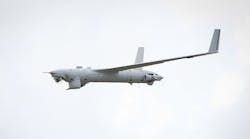By Flora Iacchia
The federal government is on a mission to upgrade from IPv4 (Internet Protocol version 4) to IPv6, which represents the new generation of Internet protocol, mandated by a 2005 directive from the U.S. Office of Management and Budget. In this equation, military and aerospace organizations, as well as defense agencies, are particularly sensitive to the potential new national and global defense advantage that IPv6 compliance offers.
Abiding to IPv6 protocol brings the promise of enhanced security in information exchange in a Web-centric environment. Plus, the ability to meet a greater threshold of security in this arena can be a significant contributing factor in minimizing the vulnerability risk in the war against terrorism and other threats that emanate daily from the Internet.
The looming threat grows each day, and the danger of Internet terrorist attacks has never been greater. A major challenge for military and aerospace organizations and defense agencies is the frequent use by terrorist organizations of the latest technologies, while the federal government and its contractors rely on legacy tools and home-grown COTS applications and technologies.
There is no reason to delay compliance to IPv6; the technologies are available today that will permit these organizations and defense entities to begin to comply now.
What’s at stake is taking advantage of the wealth of knowledge that exists on IPv6 and making the transition to a robust IPv6 environment to pave the way to more secure communications in national and global military and aerospace environments.
IPv6 SWAT team
Here are three steps that can empower decision-makers and their teams to make this happen.
First, IT leaders must realize that the dollar amount to speed this transition will be significant. In fact, an estimate floating in government circles is that the government tab for this transition will be approximately $25 billion. This is according to the GAO (Government Accountability Office). This great price tag is reason enough to appoint an IPv6 SWAT team that will look into hot compliance issues such as cross-agency interoperability, external and internal interoperability, and compliance implementation.
Second, it is important that this IPv6 SWAT team is accountable to the organization’s chief information officer to provide a point of contact responsible for coordinating all the facets of this transition, including planning, processes, migration, implementation, testing, support, and adherence to IPv6 requirements.
Third, officials must keep in mind the importance of clear reporting lines with clear roles and responsibilities along with a series of visible milestones that must be achieved across the entire lifecycle of the transition period.
IPv6-diligent vendors
Let’s face it, the military and aerospace organization or defense agency can take a giant step toward speeding its IPv6 transition by interfacing with vendors that are already, or in progress of, obtaining their certification of IPv6-ready technology by recognized organizations such as the University of New Hampshire InterOperability Laboratory (UNH-IOL; www.iol.unh.edu).
This organization is the networking industry’s major independent proving ground for developing technologies. The UNH-IOL houses more than 32,000 square-feet of laboratory space with 60 testing stations. The laboratory provides leading-edge facilities and support in group tests and technology forums devoted to nearly every facet of networking, from Fast Ethernet, to SAS, to wireless LANs, and VoIP. It is the only full-scale testing lab in the world that is university based and completely market driven.
These types of industry-recognized labs make it easier for military and aerospace organizations to work with vendors that help make IPv6 compliance a reality with their customers. One example is 3K Computers in Boca Raton, Fla., which joined the UNH-IOL IPv6 Consortium to verify that its computers meet the requirement of IPv6-tested operating systems.
The advantage of dealing with an “IPv6-ready” vendor is the reliability of machines tested in a holistic manner, which takes into account inter-operability within an IPv6 network. This is important for military and aerospace agencies that must ensure that their IPv6 equipment is suitable for internal communication exchange and cross-agency communication. In addition to year-round testing for the IPv6 Ready program, the UNH-IOL maintains the world’s largest multivendor IPv6 test bed, the Moonv6 network, which various U.S. Defense Department agencies have used for interoperability testing since 2003.
Failure to deal with IPv6-certified vendors will make it more time-consuming for military and aerospace organizations to evaluate and bring on board tested computers that properly support IPv6 tested operating systems. Keep in mind that once these machines are in place in the defense environments, IPv6 readiness must move to the next level as the applications that are loaded on the machine also have to meet this protocol.
In this context, military and aerospace organizations are not limited to bringing on board the most recognized brands. A new breed of OEM players is willing to compete not only from the perspective of proven BTO (Built-to-Order) technology, affordability, and quality but also on terms such as faster delivery and better, more accessible support services, and compliance. These factors alone can help to speed an IPv6 transition.
Plus, this approach makes sense when one considers no one vendor will have all the IPv6-related answers and resources to support a massive government IPv6 migration effort, but a mix of vendors will, provided that their IPv6-ready technologies and services allow, for instance, the right type of interoperability and integration.
American-made IPv6-ready technologies
Today, the fabric of our economy is based on global trade. With the recent quality mishaps of products made in China and elsewhere, a viable option for the federal defense sector is to consider the benefit of bringing on board American-made IPv6-ready technologies, which are reliable, affordable, well tested, and come with U.S. support. It is not the only choice but its availability improves the odds of successful IPv6 transition. Some of these American-made, proven technologies incorporate industry-standard and robust strength innovation while providing the users the stability and reliability they need to function smoothly in an enterprise continuity driven environment.
The future complex combat systems and mobile platforms depend, in part, on effective compliance to IPv6. Advanced technologies in the military and aerospace sector can benefit from the highest threshold of information assurance and security. That’s why military and aerospace organizations must accelerate by all means their transition to IPv6 and enlist the support of their vendors in bringing on board certified IPv6 ready technologies that are tested in a holistic manner and provide a path toward interoperability and better security.
Flora Iacchia is vice president of product development at 3K Computers in Boca Raton, Fla., an IPv6 provider of enterprise U.S. built-to-order computers, desktop, workstations, and storage equipment for the federal civilian and defense sectors. Contact the author by e-mail at [email protected], or online at www.3kcomputers.com.


